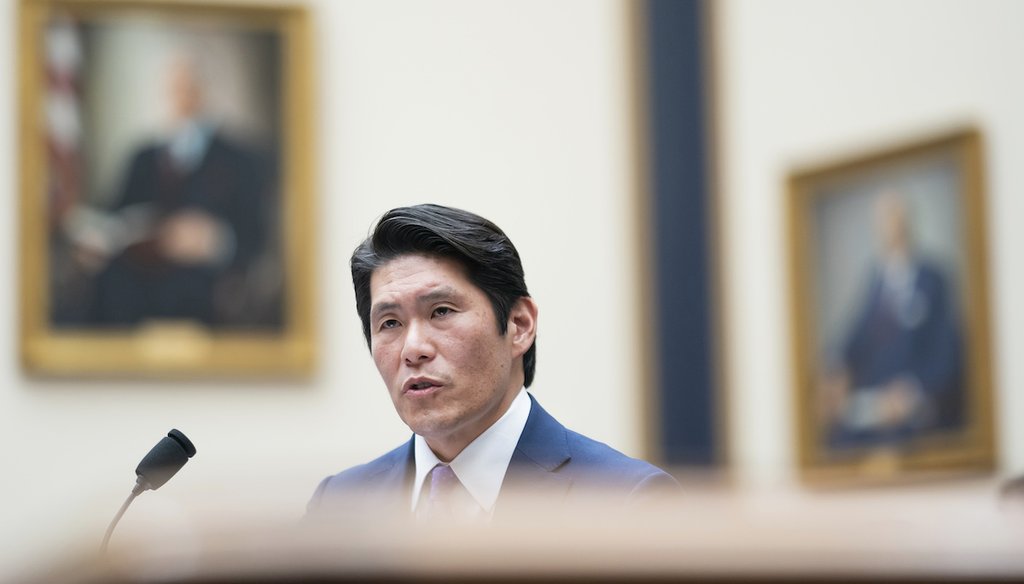Get PolitiFact in your inbox.

Former Special Counsel Robert Hur speaks March 12, 2024, during a hearing of the House Judiciary Committee in Washington. (AP)
If Your Time is short
-
In a March 12 House Judiciary Committee hearing, Republicans and Democrats pressed former Special Counsel Robert Hur over his investigation into President Joe Biden’s handling of classified documents, which produced no criminal charges but raised questions about Biden’s memory.
-
Republicans said the decision not to prosecute Biden meant he was held to a lower standard than former President Donald Trump, who faces charges in his own classified documents case. This ignores that Trump was charged with multiple counts of obstructing justice and related charges, whereas Hur said Biden cooperated fully with his investigation.
-
Democrats said that by not bringing charges against Biden, the investigation “exonerated” the president. Exoneration is not a prosecutor’s role, and although Hur decided not to charge Biden, he documented shortcomings with Biden’s handling of classified documents.
-
Our mission: Help you be an informed participant in democracy. Learn more.
Testifying before Congress, former Special Counsel Robert Hur defended his February report detailing Joe Biden’s handling of classified documents, saying it neither exonerated nor disparaged the current president. House Judiciary Committee members compared and contrasted Biden’s case with former President Donald Trump’s classified documents investigation.
In his report, Hur concluded that criminal charges were not warranted but criticized Biden’s practices in handling sensitive documents. Hur wrote that his investigation found evidence that Biden had "willfully retained and disclosed classified materials" as a private citizen after serving as vice president.
During the March 12 hearing in Washington, Democratic lawmakers said Biden cooperated with investigators whereas Trump tried to thwart them. Republican lawmakers countered that Biden was treated differently from Trump.
"But then you apply this senile cooperator theory, that because Joe Biden cooperated and the elevator didn’t go to the top floor, you don’t think you get a conviction," Rep. Matt Gaetz, R-Fla. said.
Hur defended his report’s characterization of Biden’s faulty memory. "I could not make that determination without assessing the president’s state of mind," he said.
The release of the transcript of interviews between Hur’s team and Biden also shed new light on an exchange about Biden’s deceased son, Beau Biden.
We fact-checked a few claims made by lawmakers that were missing context or misleading.
Rep. Tom McClintock, R-Calif.: "Here's the problem: Donald Trump is being prosecuted for exactly the same act that you've documented that Joe Biden committed."
This is misleading.
Trump was indicted in June 2023 on about three dozen counts, including willful retention of national defense information, conspiracy to obstruct justice and making false statements.
"Trump’s indictment alleges a pattern of deliberate and willful behavior and lying to federal investigators that Hur does not find in the Biden investigation," Joan Meyer, who has worked as a federal and local level prosecutor and is now a partner at the law firm Thompson Hine LLP, told PolitiFact.
Hur’s report drew several distinctions between his Biden investigation and Special Counsel Jack Smith’s investigation of Trump’s handling of classified documents.
Hur wrote in his report that Trump’s case had "several material distinctions" from Biden’s, including that Biden cooperated with the investigation while Trump thwarted federal efforts to retrieve documents.
Biden "turned in classified documents to the National Archives and the Department of Justice, consented to the search of multiple locations including his homes, sat for a voluntary interview, and in other ways cooperated with the investigation," Hur wrote.
Biden’s lawyers discovered the documents Nov. 2, 2022, and notified the National Archives and Records Administration the same day.
Hur wrote that according to Trump’s indictment, the former president "not only refused to return the documents for many months, but he also obstructed justice by enlisting others to destroy evidence and then to lie about it."
Rep. Jerrold Nadler, D-N.Y.: "The Hur report represents the complete and total exoneration of President Biden."
Multiple former prosecutors told us that prosecutors typically recommend for or against prosecution but do not "exonerate."
The Merriam-Webster dictionary says exonerate "implies a complete clearance from an accusation or charge and from any attendant suspicion of blame or guilt."
Hur didn’t use the word "exonerate" in his report, and he pointed that out during his testimony. "That is not a word I use in the report and that’s not part of my task as a prosecutor," Hur said after U.S. Rep. Pramila Jayapal, D-Wash., repeated the term.
"Hur’s report finds insufficient evidence to prosecute President Biden because the evidence he generated is not likely to secure a criminal conviction," Meyer said. "That is the standard that federal prosecutors use to determine whether to charge. Declining to charge is not the same as exonerating a defendant. Prosecutors only determine if the weight of the evidence supports prosecution and conviction beyond a reasonable doubt."
Kendall Coffey, a former U.S. Attorney in the Southern District of Florida, agreed that prosecutors do not typically describe a decision not to bring charges as an "exoneration."
He said a prosecutor might use the term "exonerate" when there is a determination of innocence through evidence such as DNA, rather than simply a decision not to prosecute.
Nadler’s mention of "exoneration" was a reference to Trump, who said Special Counsel Robert Mueller’s 2019 report "exonerated" Trump of colluding with Russia to tip the 2016 presidential election in his favor. Mueller said the report hadn’t done so.
Rep. Madeleine Dean, D-Pa.: "Your report on Page 208 says that Mr. Biden couldn't come up with the date, the year, of his son Beau Biden's death, when in fact in the transcript it shows that you asked him the month. And you know what he said Mr. Hur? He said, ‘Oh, God, May 30.’ Would you like to correct the record? His memory was pretty firm on the month and the day."
The transcript of Hur’s interview with Biden didn't show Hur asking what month Beau Biden died. But Biden did identify the month and day unprompted.
Hur asked Biden about where he kept papers related to a book in progress and a cancer research initiative. Biden responded with a story that started with him asking Hur whether the time frame in question was "2017, 2018, that area?"
Hur said yes. Biden answered, "Remember, in this time frame, my son is — either been deployed or is dying," and discussed his thinking about running for president. Then Biden said, "And, and so what was happening, though — what month did Beau die? Oh, God, May 30th."
Two other people in the room, one named and one unnamed in the transcript, entered the conversation, saying, "2015."
Biden: "Was it 2015 he had died?"
An unidentified male speaker said, "It was May of 2015."
Biden: "It was 2015."
Hur wrote in his report that Joe Biden "did not remember, even within several years, when his son Beau died."
Biden later recounted this conversation at a Feb. 8 press conference and said the special counsel asked him a question about Beau’s death, even though the transcript shows that is not how Beau Biden’s name came up during the interview.
"I know there’s some attention paid to some language in the report about my recollection of events. There’s even a reference that I don’t remember when my son died. How in the hell dare he raise that? Frankly, when I was asked the question, I thought to myself it wasn’t any of their damn business," Biden said.
Hur’s lawyer, William Burck, said Dean’s "implication was that he had asked Biden when his son died. The transcript speaks for itself. Hur did not ask him that."
PolitiFact Staff Writers Maria Ramirez Uribe and Ian McKinney contributed to this report.
RELATED: President Biden said he didn’t have highly classified documents. The special counsel says otherwise.
RELATED: Trump says he ‘cooperated far more’ than Biden in classified documents cases. Pants on Fire!
RELATED: Fact-checking Joe Biden about sharing classified materials, keeping them in lockable cabinets
Our Sources
House Judiciary Committee, Robert Hur interview with President Joe Biden, Oct. 8-9, 2024
C-SPAN, House Judiciary Committee hearing with Robert Hur, March 12, 2024
The White House, Remarks by President Biden, Feb. 8, 2024
U.S. Attorney’s Office, Special counsel report in Biden classified documents case, Feb. 8, 2024
Statement from Special Counsel to the President Richard Sauber, Feb. 8, 2024
WhiteHouse.gov, Statement from President Joe Biden, Feb. 8, 2024
The White House, Remarks by President Biden, Feb. 8, 2024
The New York Times, How the special counsel’s portrayal of Biden’s memory compares with the transcript, March 12, 2024
The Washington Post, Read the full transcript of Robert Hur’s interview with President Biden, March 12, 2024
The Associated Press, Hur said Biden couldn’t recall when his son died. The interview transcript is more complicated, March 12, 2024
The Associated Press, Mueller declares his Russia report did not exonerate Trump, May 29, 2019
PolitiFact, Fact-checking Donald Trump's claim of no collusion, no obstruction from Mueller report, March 24, 2019
PolitiFact, Biden won’t be charged in classified documents case, but special counsel report questions his memory, Feb. 9, 2024
PolitiFact, Trump indicted in classified documents case: Here’s the timeline, July 6, 2023
PolitiFact, What Biden omits in his repeated claim about teaching at the University of Pennsylvania, Sept. 19, 2023
Congressional Research Service, The Protection of Classified Information: The Legal Framework, Feb. 2, 2023
The White House, Executive Order 13526- Classified National Security Information, Dec. 9, 2009
D.C. Security Clearance Consultants, Sensitive Compartmented Information (SCI), accessed Feb. 9, 2024
Fox LIVE: Robert Hur testifies on Biden classified documents investigation | LiveNOW from FOX, March 12, 2024
Email interview, Jon A. Sale, Sale & Weintraub, P.A., March 12, 2024
Email interview, Kendall Coffey, Coffey Burlington, a former U.S. Attorney for the Southern District of Florida, March 12, 2024
Email interview with Joan Meyer, partner at the law firm Thompson Hine LLP, March 12, 2024
Email interview, William Burck, attorney for Robert Hur, March 12, 2024











































